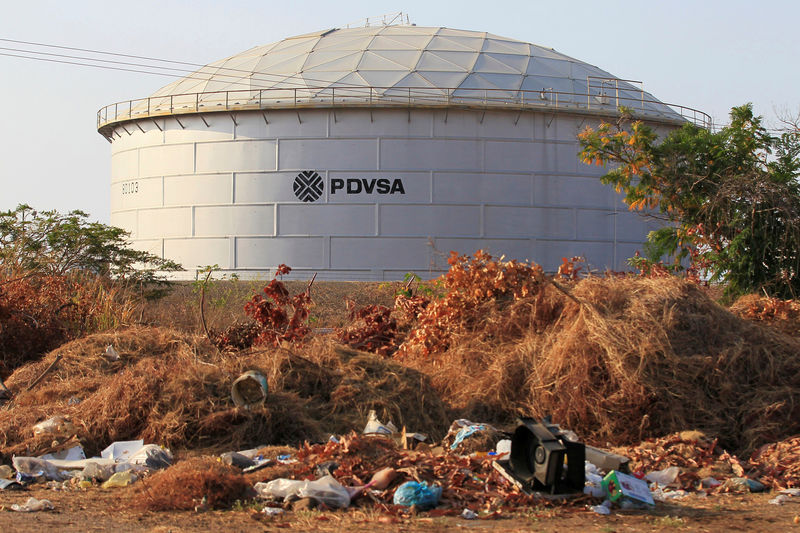By Mircely Guanipa and Deisy Buitrago
PUNTO FIJO/CARACAS (Reuters) - Venezuelan state-owned oil company PDVSA expects its crucial crude upgraders to operate well below capacity this month, according to industry sources and documents seen by Reuters, as U.S. sanctions and energy blackouts hit the OPEC nation's oil industry.
Venezuela depends on the upgraders, which are mostly operated by joint ventures with foreign companies, to convert the extra-heavy crude oil produced in the Orinoco Belt into exportable grades usable in overseas refineries. Together, they have a capacity of some 700,000 barrels per day.
Prolonged power outages have been adding to problems blending and exporting crude, as PDVSA's main oil port, Jose, in northeastern Venezuela remained paralyzed.
The Petropiar and Petromonagas upgraders, part-owned by U.S. oil major Chevron (NYSE:CVX) and Russian giant Rosneft respectively, have not fully restarted since a March 7 blackout.
Petrocedeno, part-owned by France's Total and Norway's Equinor, stopped working after a second blackout on March 25, as did PDVSA's fully-owned Petrosanfelix.
"The upgraders are still halted," oil workers' union leader Jose Bodas said.
According to an internal PDVSA document seen by Reuters this week, Petropiar and Petrocedeno are "in the process of restarting."
Petromonagas is expected to undergo "cleaning and repair" this month after maintenance workers found two of its furnaces were obstructed by waste products, while a maintenance process at Petrosanfelix was halted, according to the document.
"The upgraders are not expected to increase processing," an internal PDVSA document detailing planning for the month of April reads.
It said Petrosanfelix was unlikely to restart, while the remaining three would likely process crude at reduced rates.
One industry source, speaking on the condition of anonymity because of a lack of authorization to speak publicly, said the blockages of Petromonagas' furnaces was likely to keep the upgrader out of commission for 20 days.
The source said the company had canceled all its shipments of upgraded crude for April.
Neither PDVSA nor Venezuela's oil ministry responded to a request for comment. Total declined to comment, while Chevron referred questions to Petropiar, which like all oil joint ventures in Venezuela is controlled by PDVSA. Rosneft and Equinor did not respond to requests for comment.
EXPORTS TUMBLED IN FEBRUARY
The blackouts have presented an additional obstacle for President Nicolas Maduro's efforts to halt a years-long drop in oil output, Venezuela's main source of government revenue. The decline in production is expected to accelerate after the United States sanctioned PDVSA in late January, as part of its bid to oust Maduro from power.
Exports fell about 40 percent in February in the immediate aftermath of the sanctions, but remained stable in March at slightly below 1 million barrels per day (bpd).
To keep exports stable with limited upgrading capacity, PDVSA will need to import diluents - light crude or heavy naphtha - that can be blended directly with extra heavy oil from the Orinoco belt to make exportable grades.
But the sanctions blocked U.S. companies, previously the main suppliers of diluents to Venezuela, from selling the products to PDVSA.
The Petrosinovensa blending facility, a joint venture of PDVSA and China's CNPC that produces Merey crude, was producing about 60 percent of the 132,000 bpd of upgraded crude it planned to produce, the PDVSA document showed.
To avoid a further drop in exports, the country has recently turned to Rosneft for supply of diluents, according to the industry source and Refinitiv Eikon data.

One tanker, the Torm Hilde carrying 780,000 barrels of naphtha, has set sail for Venezuela, while a second one with 500,000 barrels was expected to set sail soon.